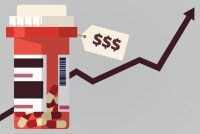Latest California Healthline Stories
Study: ‘Ubiquitous’ Nature Of Painkillers Lands Kids — Even Toddlers — In The ER
New research tracks how the widespread availability of these high-powered medications is causing a high rate of hospitalizations for opioid poisoning among children.
Niños pequeños terminan en emergencias médicas por consumo de opioides y analgésicos
Un nuevo estudio destaca a un grupo de pacientes soprendente, que sufre de intoxicación por opioides en tasas que también han marcado un aumento dramático: adolescentes, niños e incluso niños pequeños.
Hospitals Say They’re Being Slammed By Drug Price Hikes
In a report out tuesday, hospital groups said drug prices have skyrocketed since 2013, triggering a huge increase in what hospitals spend on pharmaceuticals.
Young Boy’s Struggle To Survive Sparked Push For Drugs For Terminally Ill
Ten-year-old Josh Hardy died last month. His struggle to survive helped to spur laws to get unapproved drugs to the terminally ill.
Many Doctors Treating Alcohol Problems Overlook Successful Drugs
Two prescription medications have been found to be successful in helping many patients with alcohol cravings. Yet they are rarely used and many patients don’t know they exist.
The Need To Replace EpiPens Regularly Adds To Concerns About Cost
The drug’s manufacturer says it has an expiration date of 12 to 18 months but that includes distribution time, so many customers find they have to buy a new device at least once a year.
Poll Finds Majority Of Americans Want Restraints On Drug Prices
As the spiraling costs attract headlines, many people are looking to the government to rein in prescription drug prices, according to the Kaiser Family Foundation poll.
Specialty Drug Costs Soar 30% For California Pension Fund
Such medications account for more than a quarter of the state agency’s $2.1 billion in pharmacy costs.
When Drug Reviewers Leave The FDA, They Often Work For Pharma
Researchers examine the Food and Drug Administration’s “revolving door” regarding employees who worked on cancer and hematology drugs.
New California Law Allows Organizations to Buy EpiPens For Emergencies, But Will They?
The new law isn’t mandatory, and concerns about training and who can give life-saving shot remain.










